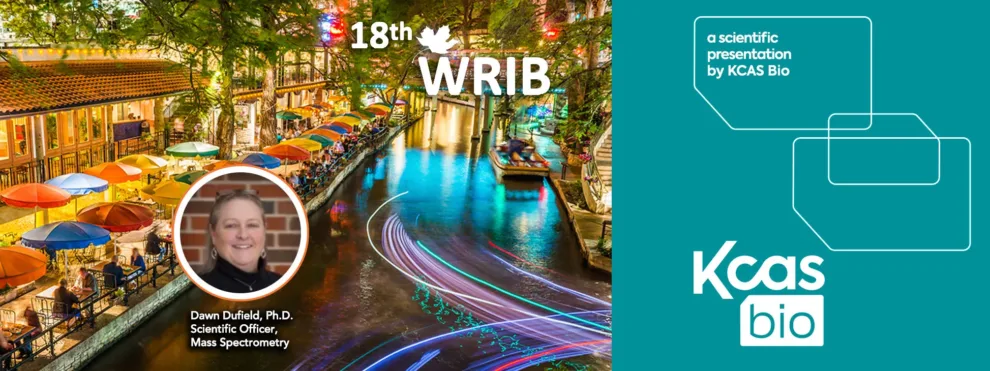Dawn Dufield, PhD is the Scientific Officer for Mass Spectrometry and has been with KCAS Bio since 2018. Before joining KCAS Bio, she worked in the quantitative large and small molecule LC-MS/MS field for Pfizer for over 20 years. Dawn has been a pioneer in the Hybrid LCMS field and has significant expertise with Fatty Acyls (eicosanoids) and Glycosphingolipids (GSLs; ceramides, hexosyl ceramides, and sphingosines) in numerous species and matrices.
Dawn has been an attendee of WRIB for years and received the Outstanding Contribution Award at the 8th WRIB in 2014. This year, she is an invited speaker for the advanced strategies for mass spectrometry assays special workshop, where she’ll be discussing some of her latest work regarding the development, and qualification, of small molecule biomarker panels.
Dawn’s presentation this year titled “Development and Fit-for-Purpose Qualification of Small Molecule Biomarker Panels by LC-MS/MS – Examples and Case Studies” will highlight some of the challenges that she has encountered during the development and qualification of assays for lipid biomarker panels, primarily with GSLs, but also with eicosanoids and amino acid panels, and the various strategies that have been developed to resolve these issues.
Unique Assays Presenting Common Challenges
While eicosanoids and glycosphingolipids each present their own unique challenges, the most fundamental issue faced during the development of any of these assays that utilize a large number of analytes is their natural, endogenous presence. This endogenous presence can greatly complicate the process of creating calibration curves for these assays and choosing an appropriate standard for use. Additionally, when developers are seeking to multiplex several related, yet different biomarkers, they face additional challenges, including which specific biomarkers to include and how to approach the resulting dynamic range of analytes in a single assay.
Identifying Solutions
In her role at KCAS Bio, Dawn has worked to identify solutions to these challenges, including methods to simplify sample preparation and load large sample volumes, maintaining high sample throughput in complex panels, and multiplex assay development over varying concentration gradients. These solutions will be detailed in her presentation, providing valuable insight for those interested in developing panels of biomarkers.
Case Studies
Dawn will also include some specific case studies in her presentation to further highlight the applicability of these assays across multiple species and fluids, as well as to demonstrate how pilot studies can be used to aid developers in narrowing down multiplex assays to focus on relevant markers for further qualification.
What Makes WRIB the Ideal Location for This Research Presentation?
Biomarker assays such as those being detailed by Dawn are crucial for the success of drug development, with impacts on developer’s timelines as well as understanding proof of pharmacology or proof of mechanism, highlighting the importance of this research to a diverse population.
WRIB attendees include biotech/pharma CROs, top industry professionals, as well as global regulatory agencies, all brought together in the fast-paced environment that is unique to WRIB. Between immersive main workshops, full-day specialized workshops, and nightly networking receptions, there is no better place to be for those interested in learning more about the latest issues in Bioanalysis. Additionally, this year the global CRO consortium immediately follows WRIB, bringing together even more regulatory specialists in one central location to further maximize networking opportunities for attendees of both conventions.
Why is KCAS Bio the Ideal Choice for This Presentation?
KCAS Bio has a long history in the field of bioanalysis and has worked extensively with biomarker panels over the past 6 years, which makes them the ideal presenter on such a technically challenging topic. Not only have they worked with nearly 20 similarly related glycosphingolipids biomarkers in their assays, but they also have the relevant knowledge to be able to leverage multiple markers in a single assay, skills that are crucial for assay development and validation.
In addition to their presentation on the advanced strategies for mass spectrometry, KCAS Bio will be in attendance at other sessions throughout the week, and Dawn will contribute to one of the white papers coming out summarizing these recommendations after the conference.

